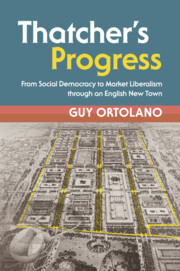Thatcher's Progress
From Social Democracy to Market Liberalism through an English New Town
$34.99 (P)
Part of Modern British Histories
- Author: Guy Ortolano, New York University
- Date Published: July 2024
- availability: Available
- format: Paperback
- isbn: 9781108710831
$
34.99
(P)
Paperback
Other available formats:
Hardback, eBook
Looking for an examination copy?
This title is not currently available for examination. However, if you are interested in the title for your course we can consider offering an examination copy. To register your interest please contact [email protected] providing details of the course you are teaching.
-
During the quarter of a century after the Second World War, the United Kingdom designated thirty-two new towns across England, Scotland, Wales, and Northern Ireland. Why, even before selling council houses or denationalising public industries, did Margaret Thatcher's government begin to privatise these new towns? By examining the most ambitious of these projects, Milton Keynes, Guy Ortolano recasts our understanding of British social democracy, arguing that the new towns comprised the spatial dimension of the welfare state. Following the Prime Minister's progress on a tour through Milton Keynes on 25 September 1979, Ortolano alights at successive stops to examine the broader histories of urban planning, modernist architecture, community development, international consulting, and municipal housing. Thatcher's journey reveals a dynamic social democracy during its decade of crisis, while also showing how public sector actors begrudgingly accommodated the alternative priorities of market liberalism.
Read more- Places Britain's new towns programme within a global context
- Offers fresh interpretations of the welfare state, social democracy, and market liberalism - three of the most significant subjects in twentieth-century historiography
- Ranges widely across urban, architectural, political, and intellectual history
Awards
- Winner, 2021 Best Book in Non-North American Urban History, Urban History Association
Reviews & endorsements
'[S]mart, forensic, geographically situated … Ortolano shows us how the government policies of the 1980s - never repudiated - prefigured the terrible housing crisis in Britain today.' Susan Pedersen, London Review of Books
See more reviews'Ortolano's brilliant book allows us not only to grasp that cultural world, but more generally to appreciate how the construction of Milton Keynes illustrates fundamental changes in British society.' Martin Daunton, The Journal of Modern History
‘Ortolano not only gives us a strikingly rich account of a key state investment, but also contributes to a wider discussion about how we frame post-war British history … This book is a key text within the ‘New Urban Political History’.’ Tom Kelsey, English Historical Review
'[A] wide-ranging, elegantly written, deeply serious, forcefully argued book, with an impressive command of multiple historiographies … It should become a model for writing histories that provide inventive answers to intellectually ambitious questions …' Otto Saumarez Smith, Reviews in History
'… Ortolano situates a seemingly provincial moment of British planning in a distinctly global context … In Thatcher's Progress, Ortolano has produced one of the stand-out studies of urban history in the last few years. This is precise, stimulating material that showcases the characteristic thoughtfulness and precision of the author's work … This book deserves to be read widely and will likely find a market beyond the academy …' James Greenhalgh, Urban History
'… by revealing the real and potential dynamism of social-democratic politics, architecture, and ideology in one community, [Ortolano] suggests and provides a way for scholars to rethink the features and fortunes of other political orders, such as New Deal liberalism, at every scale.' Daniel Wortel-London, Journal of Urban History
'… Thatcher's Progress will be essential reading for a diverse range of scholars - from those interested in the history of urban space, architecture, and housing to those concerned with questions of identity, transnational intellectual politics, or the legacies of empire - and its approach will encourage every historian of postwar Britain to reconsider linear narratives which flatten social democracy's vibrant history.' David Civil, Journal of British Studies
'Rectifying decades of denigration, Thatcher's Progress is a story of unintended consequences, unrealised futures, and historical change from the perspective of history's losers, charting the complex relationship between the two rival ideological formations that dominated the latter half of the twentieth century.' Freddie Meade, Contemporary British History
'… Ortolano's new book is an insightful approach for those interested not only in British and urban history, but also in terms of revealing the dynamic and shifting nature of ideologies from a historical perspective.' Iker Itoiz Ciáurriz, Journal of Contemporary History
'Modern British political history is coming to be written through urban history. With great deftness, and a nice sense of irony, Guy Ortolano tracks the transition from social democracy to neo-liberalism through the history of Milton Keynes. The result is a significant new study of the continuities as well as the changes in 'Thatcherism'.' Simon Gunn, University of Leicester
'A fascinating account of the spatial politics of the British new towns program. Ortolano's lively history of Milton Keynes illuminates the rise and fall of British social democracy and the legacy of postwar urban planning. Thatcher's Progress is a masterly portrait of an iconic urban place. Elegantly written and a trailblazing interpretive frame makes this an instant classic in urban history.' Rosemary Wakeman, author of Practicing Utopia: An Intellectual History of the New Town Movement
‘… [An] important and highly erudite book. [It] makes an original and largely persuasive case, one less about Milton Keynes alone than about how later twentieth-century British and intellectual history is too one-dimensionally periodized, as is the enduring vitality of progressive ideas.' Jeremy Nuttall, American Historical Review
‘…This book should be required reading for all undergraduate and postgraduate students of planning. [It] will help to rebuild our confidence in British town and country planning.' Lee Shostak, Town and Country Planning
Customer reviews
Not yet reviewed
Be the first to review
Review was not posted due to profanity
×Product details
- Date Published: July 2024
- format: Paperback
- isbn: 9781108710831
- length: 317 pages
- dimensions: 229 x 152 x 17 mm
- weight: 0.462kg
- availability: Available
Table of Contents
List of maps
List of illustrations
Acknowledgments
Introduction
1. Horizons
2. Planning
3. Architecture
4. Community
5. Consulting
6. Housing
Conclusion
Select bibliography
Index.
Sorry, this resource is locked
Please register or sign in to request access. If you are having problems accessing these resources please email [email protected]
Register Sign in» Proceed
You are now leaving the Cambridge University Press website. Your eBook purchase and download will be completed by our partner www.ebooks.com. Please see the permission section of the www.ebooks.com catalogue page for details of the print & copy limits on our eBooks.
Continue ×Are you sure you want to delete your account?
This cannot be undone.
Thank you for your feedback which will help us improve our service.
If you requested a response, we will make sure to get back to you shortly.
×





